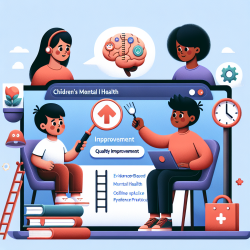Recent research published in the article "School absenteeism in children with special health care needs. Results from the prospective cohort study ikidS" has highlighted critical insights into the challenges faced by children with special health care needs (SHCN) in maintaining regular school attendance. This blog aims to translate these findings into actionable strategies for practitioners to enhance their skills and improve educational outcomes for children with SHCN.
Understanding the Research
The study conducted by Schlecht et al. (2023) found that children with SHCN have significantly higher rates of school absenteeism compared to their peers. The adjusted rate ratio was 1.37, indicating that children with SHCN were 37% more likely to miss school days due to illness. The most significant factors contributing to absenteeism were:
- Functional limitations
- Treatment or counseling for emotional, behavioral, or developmental problems
- Experiencing multiple SHCN consequences
Implications for Practitioners
Practitioners working with children with SHCN can leverage these findings to tailor their interventions and support strategies more effectively. Here are some key takeaways:
1. Early Identification and Continuous Monitoring
Implementing regular screenings to identify children with SHCN early can help in planning timely interventions. Continuous monitoring of school attendance can help in identifying patterns and causes of absenteeism, allowing for proactive measures.
2. Tailored Interventions
Interventions should be customized to address the specific needs of each child. For instance, children with functional limitations may benefit from physical therapy, while those receiving treatment for emotional or behavioral issues may require additional counseling support.
3. Collaborative Approach
Collaboration between educators, healthcare providers, and parents is crucial. A multidisciplinary team can ensure that the child receives comprehensive support, addressing both educational and health-related needs.
4. Leveraging Technology
Online therapy services, like those provided by TinyEYE, can be particularly beneficial for children with SHCN. These services offer flexible and accessible support, helping to reduce absenteeism by providing therapy sessions that can be scheduled around the child's school timetable.
Encouraging Further Research
While the ikidS study provides valuable insights, there is still much to learn about the causal pathways and effective interventions for reducing absenteeism among children with SHCN. Practitioners are encouraged to engage in further research and contribute to the growing body of evidence. Understanding the specific needs and challenges of this population can lead to more effective and targeted interventions.
To read the original research paper, please follow this link: School absenteeism in children with special health care needs. Results from the prospective cohort study ikidS










